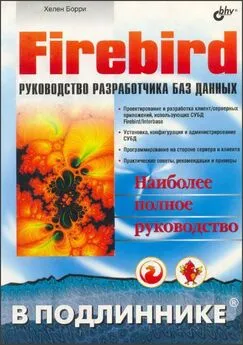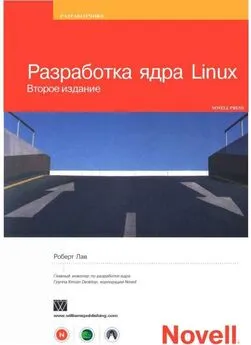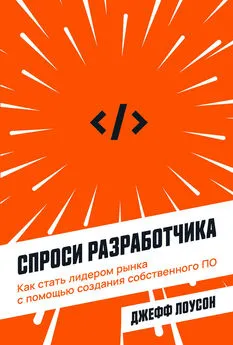Ори Померанц - Энциклопедия разработчика модулей ядра Linux
- Название:Энциклопедия разработчика модулей ядра Linux
- Автор:
- Жанр:
- Издательство:неизвестно
- Год:неизвестен
- ISBN:нет данных
- Рейтинг:
- Избранное:Добавить в избранное
-
Отзывы:
-
Ваша оценка:
Ори Померанц - Энциклопедия разработчика модулей ядра Linux краткое содержание
Linux Kernel Module Programming Guide свободная книга; Вы можете воспроизводить и/или изменять ее в соответствии с версией 2 (или, в вашем случае, любой более поздней версией) GNU General Public License, опубликованной Free Software Foundation. Версия 2 поставляется с этим документом в Приложении E.
Эта книга распространяется в надежде, что будет полезна, но без какой-либо гарантии; даже без подразумеваемой гарантии высокого спроса или пригодности какой-либо для специфической цели.
Автор поощряет широкое распространение этой книги для персонального или коммерческого использования, если вышеупомянутое примечание относительно авторского права остается неповрежденным, и распространитель твердо придерживается условий GNU General Public License (см. Приложение E). Вы можете копировать и распространять эту книгу бесплатно или для получения прибыли. Никакое явное разрешение не требуется от автора для воспроизводства этой книги в любой среде, физической или электронной.
Обратите внимание, производные работы и переводы этого документа должны быть помещены согласно GNU General Public License, и первоначальное примечание относительно авторского права должно остаться неповрежденным. Если Вы пожертвовали новый материал этой книге, Вы должны сделать исходный текст доступным для ваших изменений. Пожалуйста делайте изменения и модификации, доступные непосредственно поддерживающему данный проект Ori Pomerantz. Он объединит модификации и обеспечит непротиворечивость изменений для всего Linux сообщества.
Если Вы планируете издавать и распространять эту книгу коммерчески, пожертвования, лицензионные платежи, и/или напечатанные копии будут высоко оценены автором и Linux Documentation Project (LDP). Содействие таким образом показывает вашу поддержку свободного программного обеспечения и Linux Documentation Project. Если Вы имеете вопросы или комментарии, пожалуйста войдите в контакт с автором по адресу, приведенному выше.
Энциклопедия разработчика модулей ядра Linux - читать онлайн бесплатно полную версию (весь текст целиком)
Интервал:
Закладка:
* This allows processes to be killed or stopped. */
/*
* Emmanuel Papirakis:
*
* This is a little update to work with 2.2.*. Signals
* now are contained in two words (64 bits) and are
* stored in a structure that contains an array of two
* unsigned longs. We now have to make 2 checks in our if.
*
* Ori Pomerantz:
*
* Nobody promised me they'll never use more than 64
* bits, or that this book won't be used for a version
* of Linux with a word size of 16 bits. This code
* would work in any case. */
#if LINUX_VERSION_CODE >= KERNEL_VERSION(2,2,0)
for(i=0; i<_NSIG_WORDS && !is_sig; i++) is_sig = current->signal.sig[i] & current->blocked.sig[i];
if (is_sig) {
#else
if (current->signal & current->blocked) {
#endif
/* It's important to put MOD_DEC_USE_COUNT here,
* because for processes where the open is
* interrupted there will never be a corresponding
* close. If we don't decrement the usage count
* here, we will be left with a positive usage
* count which we'll have no way to bring down to
* zero, giving us an immortal module, which can
* only be killed by rebooting the machine. */
MOD_DEC_USE_COUNT;
return -EINTR;
}
}
/* If we got here, Already_Open must be zero */
/* Open the file */
Already_Open = 1;
return 0; /* Allow the access */
}
/* Called when the /proc file is closed */
#if LINUX_VERSION_CODE >= KERNEL_VERSION(2,2,0)
int module_close(struct inode *inode, struct file *file)
#else
void module_close(struct inode *inode, struct file *file)
#endif
{
/* Set Already_Open to zero, so one of the processes
* in the WaitQ will be able to set Already_Open back
* to one and to open the file. All the other processes
* will be called when Already_Open is back to one, so
* they'll go back to sleep. */
Already_Open = 0;
/* Wake up all the processes in WaitQ, so if anybody
* is waiting for the file, they can have it. */
module_wake_up(&WaitQ);
MOD_DEC_USE_COUNT;
#if LINUX_VERSION_CODE >= KERNEL_VERSION(2,2,0)
return 0; /* success */
#endif
}
/* This function decides whether to allow an operation
* (return zero) or not allow it (return a non-zero
* which indicates why it is not allowed).
*
* The operation can be one of the following values:
* 0 - Execute (run the "file" - meaningless in our case)
* 2 - Write (input to the kernel module)
* 4 - Read (output from the kernel module)
*
* This is the real function that checks file
* permissions. The permissions returned by ls -l are
* for referece only, and can be overridden here. */
static int module_permission(struct inode *inode, int op) {
/* We allow everybody to read from our module, but
* only root (uid 0) may write to it */
if (op == 4 || (op == 2 && current->euid == 0)) return 0;
/* If it's anything else, access is denied */
return -EACCES;
}
/* Structures to register as the /proc file, with
* pointers to all the relevant functions. *********** */
/* File operations for our proc file. This is where
* we place pointers to all the functions called when
* somebody tries to do something to our file. NULL
* means we don't want to deal with something. */
static struct file_operations File_Ops_4_Our_Proc_File = {
NULL, /* lseek */
module_output, /* "read" from the file */
module_input, /* "write" to the file */
NULL, /* readdir */
NULL, /* select */
NULL, /* ioctl */
NULL, /* mmap */
module_open,/* called when the /proc file is opened */
#if LINUX_VERSION_CODE >= KERNEL_VERSION(2,2,0)
NULL, /* flush */
#endif
module_close /* called when it's classed */
};
/* Inode operations for our proc file. We need it so
* we'll have somewhere to specify the file operations
* structure we want to use, and the function we use for
* permissions. It's also possible to specify functions
* to be called for anything else which could be done to an
* inode (although we don't bother, we just put NULL). */
static struct inode_operations Inode_Ops_4_Our_Proc_File = {
&File_Ops_4_Our_Proc_File,
NULL, /* create */
NULL, /* lookup */
NULL, /* link */
NULL, /* unlink */
NULL, /* symlink */
NULL, /* mkdir */
NULL, /* rmdir */
NULL, /* mknod */
NULL, /* rename */
NULL, /* readlink */
NULL, /* follow_link */
NULL, /* readpage */
NULL, /* writepage */
NULL, /* bmap */
NULL, /* truncate */
module_permission /* check for permissions */
};
/* Directory entry */
static struct proc_dir_entry Our_Proc_File = {
0, /* Inode number - ignore, it will be filled by proc_register[_dynamic] */
5, /* Length of the file name */
"sleep", /* The file name */
S_IFREG | S_IRUGO | S_IWUSR,
/* File mode - this is a regular file which
* can be read by its owner, its group, and everybody
* else. Also, its owner can write to it.
*
* Actually, this field is just for reference, it's
* module_permission that does the actual check. It
* could use this field, but in our implementation it
* doesn't, for simplicity. */
1, /* Number of links (directories where the file is referenced) */
0, 0, /* The uid and gid for the file - we give it to root */
80, /* The size of the file reported by ls. */
&Inode_Ops_4_Our_Proc_File,
/* A pointer to the inode structure for
* the file, if we need it. In our case we
* do, because we need a write function. */
NULL
/* The read function for the file.
* Irrelevant, because we put it
* in the inode structure above */
};
/* Module initialization and cleanup **************** */
/* Initialize the module - register the proc file */
int init_module() {
/* Success if proc_register_dynamic is a success,
* failure otherwise */
#if LINUX_VERSION_CODE >= KERNEL_VERSION(2,2,0)
return proc_register(&proc_root, &Our_Proc_File);
#else
return proc_register_dynamic(&proc_root, &Our_Proc_File);
#endif
/* proc_root is the root directory for the proc
* fs (/proc). This is where we want our file to be
* located. */
}
/* Cleanup - unregister our file from /proc. This could
* get dangerous if there are still processes waiting in
* WaitQ, because they are inside our open function,
* which will get unloaded. I'll explain how to avoid
* removal of a kernel module in such a case in chapter 10. */
void cleanup_module() {
proc_unregister(&proc_root, Our_Proc_File.low_ino);
}
Замена для printk
В начале (глава1), я сказал, что X и программирование модулей ядра не совместимы. Это истинно при разработке модуля, но в фактическом использовании, Вы должны быть способны послать сообщениям любому tty [10] T ele ty pe, первоначально комбинация принтера с клавиатурой, используемая, для связи с Unix системой, и сегодня абстракция для текстового потока, используемого для программы Unix, независимо от того, является ли это физическим терминалом, xterm на дисплее X, сетевое подключение, используемое telnet и т.д.
. Это важно для идентификации ошибок после того, как модуль выпущен, потому что он будет использоваться через любой из терминалов.
Путем этого достичь: используя текущий указатель на задачу, выполняемую в настоящее время, получить ее структуру tty. Затем мы смотрим внутри этой структура tty, чтобы найти указатель на функцию, пишущую строку на tty. Ее мы и используем для вывода.
/* printk.c - send textual output to the tty you're
* running on, regardless of whether it's passed
* through X11, telnet, etc.
*/
/* Copyright (C) 1998 by Ori Pomerantz */
/* The necessary header files */
/* Standard in kernel modules */
#include /* We're doing kernel work */
#include /* Specifically, a module */
/* Deal with CONFIG_MODVERSIONS */
#if CONFIG_MODVERSIONS==1
#define MODVERSIONS
#include
#endif
/* Necessary here */
#include /* For current */
#include /* For the tty declarations */
/* Print the string to the appropriate tty, the one
* the current task uses */
void print_string(char *str) {
Интервал:
Закладка:





